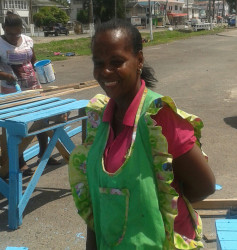On Tuesday, a public holiday, Debbie Weeks travelled from her home at Parika to Georgetown to paint the stall on which she sells on the stretch of Merriman Mall between East and Cummings streets. She was doing this at the behest of the City Council which has roped market vendors into its urban clean-up exercise.
Tuesday was not a trading day and it was a good time to talk. At 44, Weeks has been vending on the Mall for 15 years, almost a third of her life. The Mall was significant to her in other ways, too. It was here that she had met her husband, Andrew Weeks, who had been trading on the Mall fifteen years before she got there. She says he is one of the vending pioneers on the Mall.
Weeks says she detects a stubborn sluggishness in the economy. She trades in vegetables and ground provision. Some of her supplies come from Port Kaituma. For the past four years her husband has been running an eight-acre farm there. He employs seven farmhands and every fortnight a consignment of ground provision, vegetables and ginger leaves Port Kaituma by speedboat to make a delivery to a wharf in the city. A canter can charge up to $10,000 to move the ‘load’ to Bourda Street where she runs a second stall. Market labourers move part of the consignment to the Mall.

Even allowing for transportation costs from Port Kaituma she possesses a competitive advantage. Apart from her own retail establishment, she also runs a wholesale business that allows other vendors to buy her produce. Her own retail prices are identical to their own. What this means is that her wholesale customers can compete without denying her the advantage of being a producer.
The astuteness of the Weekses’ business enterprise is reflected in the strategic decisions which they sometimes make. The hot weather at Port Kaituma has reduced the production of plantains and pushed prices up. Weeks says her husband is currently taking advantage of the prevailing high prices at Port Kaituma. For the time being she must secure her supplies elsewhere.
Most days, there is a new story to be told about the impact of falling gold prices on the rest of the economy. That obtains amongst the vendors in the municipal markets as well. Miners, Weeks says, have long been key customers; the vendors anticipating their huge orders for locations in the interior. Plantains, ground provision and coconuts, she says, are good sellers with the miners. The Brazilians, she says, were good customers.
Over the past three years the patronage of the mining community has continually shrunk. These days, she says, the miners don’t come anymore.
With Christmas approaching the low price of ginger is a dead giveaway. This week, Weeks was retailing ginger at $100 per pound. Still, buyers were coming to her in a trickle. Drastic price cuts and often, dumping whole bags of ground provision and vegetables have become common occurrences. When Stabroek Business spoke with her on Tuesday Weeks was still fretting over the two bags of ginger that she had dumped the previous week.
It is, it seems, blind faith rather than a sense of confidence in the economy that keeps Weeks in business in what she regards as difficult times. Like other vendors, too, she appears to hold the view that the political change in 2015 will eventually bring with it an economic turnaround. It is, she believes, a matter of giving the administration time.
There are, it seems, other consequences for the vendors that have become more pronounced as times have grown tougher. Theft from stalls is prevalent. Vagrants and junkies make a living stealing from stalls to supply their own ‘hustles.’ It is, Weeks says, worse than it sounds. Sometimes an absence of vigilance can result in a vendor’s stall being almost emptied.
A warm and engaging woman, Weeks has the persona of that hardy breed of vendors who make a living feeding the rest of the nation. The mother of five children she spends much of her time in the city, sometimes sleeping close to her stall and at other times with relatives in Georgetown. Her 19-year-old stepdaughter, Triana, is her constant helper.
Weeks is concerned over the dislocation of the vendors on the Mall. City Hall wants to create a car park on front section of the Mall between East and Cummings streets and has asked vendors to move further east. Weeks says that for the approximately 70 vendors trading in the area, the move will mean a tight fit.
Still, with parking in the city at a premium and City Hall perpetually on the lookout for cash, there may still be a measure of uncertainty hanging over the future of vending on sections of the Merriman Mall. The current preoccupation of the vendors on the Mall is with seeking to comply with the requirements of City Hall under the current high-profile Georgetown restoration initiative. The municipality, Weeks says, is seeking greater measures of good order and uniformity. The roofs of the stalls must be slanted towards the canals that border the Mall on North Road and Church Street with the fronts of the stalls being eight feet high and the backs seven feet high. This will allow for more efficient movement of water off the land after interludes of rainfall. The Council, it seems, is also inclined to insist on a minimum width for the walkway between the stalls facing each other. That, if it happens, would further limit trading space.
On Tuesday, however, as Debbie Weeks painted her stall and spoke with Stabroek Business, those measure appeared to be the least of her concerns. The season ahead and the fortunes that it might bring for her business were, in all likelihood, a far greater preoccupation.









